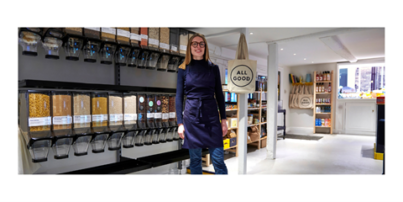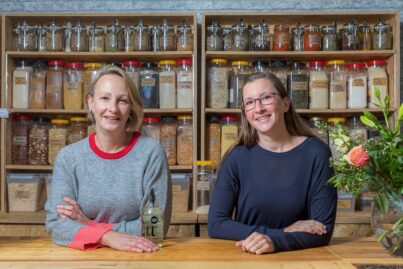This website uses cookies to ensure you get the best experience on our website. To read our full cookie policy please click here.
Steps to a Zero Waste home
A Waste Opportunity
It’s estimated that the average family wastes £720 worth of food every year. Alarmingly, this amounts to roughly one third of all food produced in the world going to waste and the contribution this has on climate change is significant.
Zero Waste is a term banded around a lot these days but how can we incorporate it into our busy daily lives?
EcoSki’s Isabel Howett explores the practical ways in which we can reduce our food and household waste and talks to people in our communities offering a far better alternative to our usual shopping habits.
How to take steps to a Zero Waste home
Reducing our personal food waste is a small but significant way to reduce our own carbon footprint. Managing the weekly shop can be an exhausting exercise, particularly during lockdown with all the family eating at home for 3 meals a day, everyday.
An excellent resource to help you plan your meals, shop, store, portion control, preserving and tips for using left overs visit https://www.foodsavvy.org.uk/savvy-tips
WRAP launches the inaugural Food Waste Action Week March 1-7. “The climate crisis remains one of the biggest and most urgent challenges facing humanity. Wasted food has a significant contribution to climate change and is something we need to address together” explains WRAP CEO Marcus Gover, “Wasted food contributes 8-10% of total man-made greenhouse gas emissions, with roughly one third of food produced around the world wasted”.
According to the Community Fridge Network (CFN) run by Hubbub.org.uk, the average family of four in the UK wastes £720 on food waste every year. The CFN diverts food that would go to waste from supermarkets to local communities. Our very own charity Root and Branchout, partnered with the Community Fridge Network in March 2020 and have already saved 3.5 tonnes of food, the equivalent of 9000 k of C02.
Problem packaging
If you are anything like us, unpacking the shopping is one job but then getting rid of all the packaging is another. Supermarket packaging keeps food on the shelves, fresher for longer, and until they find a tipping point between profit and customer satisfaction not much will change for the time being. However, exciting new ventures are popping up all over the country, challenging this status quo enabling us to make sustainable choices as to where and how we shop and spend our household budgets.
A different way to shop
In our local Rutland and surrounding areas, Refill stores have launched with the aim to help us reduce our plastic waste, support local produce and make easy steps to a more sustainable life. These stores such as Rutland Refill in Oakham, All Good Market in Stamford and the Refill Revolution from Market Harborough look fantastic and inviting, but there is no denying this is a different way to shop.
You do need to prepare pre shop; check you have your bags and containers for dry goods, liquids and perishable fruit and veg. Instead of spending the time unpackaging the plastic waste post shop, spending the time bagging your containers pre-shop means no unpacking and binning unnecessary waste at home.
All Good Market
 Annabel Britton recently returned from Paris and missing her local refill store (how wonderful does that sound) embarked on launching her own refill store in Stamford using her Parisian local as a template. The All Good Market sells loose grains, cereals, pasta and rice; snacks, oils and vinegars as well as locally sourced condiments, sauces, juices and thankfully chocolate. “It’s a big change to come to the shops with your bag full of empty containers, but more and more people are getting the hang of it. It’s a mindset change.” Annabel has sourced as much product as she can from local business and her website and social media profiles their experiences in building sustainable businesses together – allgoodmarket.co.uk
Annabel Britton recently returned from Paris and missing her local refill store (how wonderful does that sound) embarked on launching her own refill store in Stamford using her Parisian local as a template. The All Good Market sells loose grains, cereals, pasta and rice; snacks, oils and vinegars as well as locally sourced condiments, sauces, juices and thankfully chocolate. “It’s a big change to come to the shops with your bag full of empty containers, but more and more people are getting the hang of it. It’s a mindset change.” Annabel has sourced as much product as she can from local business and her website and social media profiles their experiences in building sustainable businesses together – allgoodmarket.co.uk
The latest additions include shampoos, conditioners, hand wash and cleaning products in gorgeous glass bottles you bring back to store to refill once empty.
The All Good Market’s ultimate goal is to achieve B Corp certification confirming the business is a force for good, balancing profit with the effect on people, suppliers, growers and customers at the heart of its operations. Check out the AllGoodMarket on Instagram for Annabel’s latest news and events.
Rutland Refill
The inspiration of Jenni and her partner Tom, launching in Oakham, is a community project, a charitable organisation focused on the needs of the local community and environmental projects close to home. We’ll be adding more information about this exciting new venture very soon.
Refill Revolution
 Beth Lambert launched Refill Revolution in Market Harborough three years ago. Refill Revolution is a reduced waste shop franchise that has since expanded into Oundle & Stamford. These stores offer plastic-free alternatives, household liquid refills and dry foods available to buy by weight.
Beth Lambert launched Refill Revolution in Market Harborough three years ago. Refill Revolution is a reduced waste shop franchise that has since expanded into Oundle & Stamford. These stores offer plastic-free alternatives, household liquid refills and dry foods available to buy by weight.
Beth was finding it difficult to incorporate sustainable shopping into her busy family life. “Refill Revolution’s goal is to make sustainable shopping mainstream offering shoppers low-impact and sustainable alternatives to every-day items. The team, working with other local eco businesses, fully research our suppliers to ensure they completely comply with very high ethical standards.” Refill Revolution have introduced a zero waste bundle starter kits for your kitchen, bathroom and dining, to help new customers get set for zero waste shopping in one easy shop, visit refillrevolution.co.uk
Top Tips for a Zero Waste home
Before leaving the house
- Check the freezer, cupboards and the fridge pre shop
- Always remember your shopping bags and food containers for refill shopping
- Carry your own containers and utensils for take-out drinks, food and leftovers. We love these flasks and lunchboxes from Black and Blum
The Food Shop
- Shop Local. Choose your local farmers markets, butchers, bakers’, delis and refill stores. Take containers for meat, loose fruit and veg that won’t survive the journey home.
- No more frozen food convenience, rather buy bulk and freeze what you don’t need immediately.
- Buy fresh bread that comes in either paper bags or no bags.
- Choose milk and yoghurts in returnable glass bottles.
- Buy large wheels of unwrapped cheese and take re–usable cloth squares to keep the cheese in.
- Embrace the bulk bins for your dried food – rice, grains, pasta, beans, seeds, nuts, flour, baking soda, cereals, granola, oils, butter, olives, tea and coffee, and learn how to buy in weight.
- Cut out plastic-bottled beverages and condiments and choose glass containers.
- Composting food waste reduces plastic the use bin bags and keeps organic matter out of landfill.
The Cleaning Cupboard
- Make your own cleaning products using vinegar, baking soda and lemons
- Use powdered dishwasher detergent from a cardboard box.
- Use natural cleaning cloths and scrubbers (cut up old clothing and towels are the most sustainable option of all),
Personal Care
- Switch to bar soap or refill your glass bottle with liquid soap.
- Choose beauty products in metal tins or glass jars rather than plastic ones.
- Ditch the plastic razor
- Try biodegradable toothbrushes and zero waste dental floss.
- Choose toilet paper that’s not wrapped in plastic, brands like Who gives a crap
- Use plastic-free feminine hygiene products available in most high street pharmacists’

